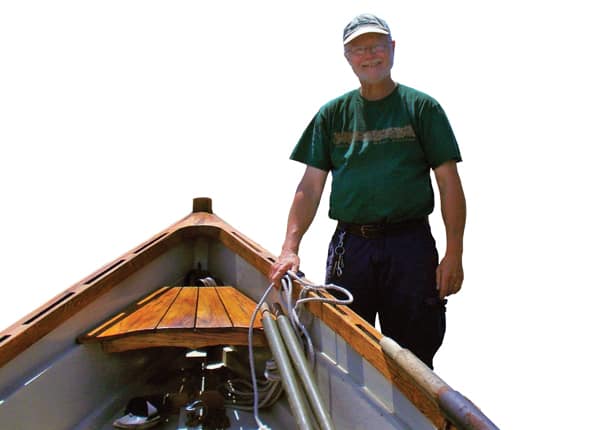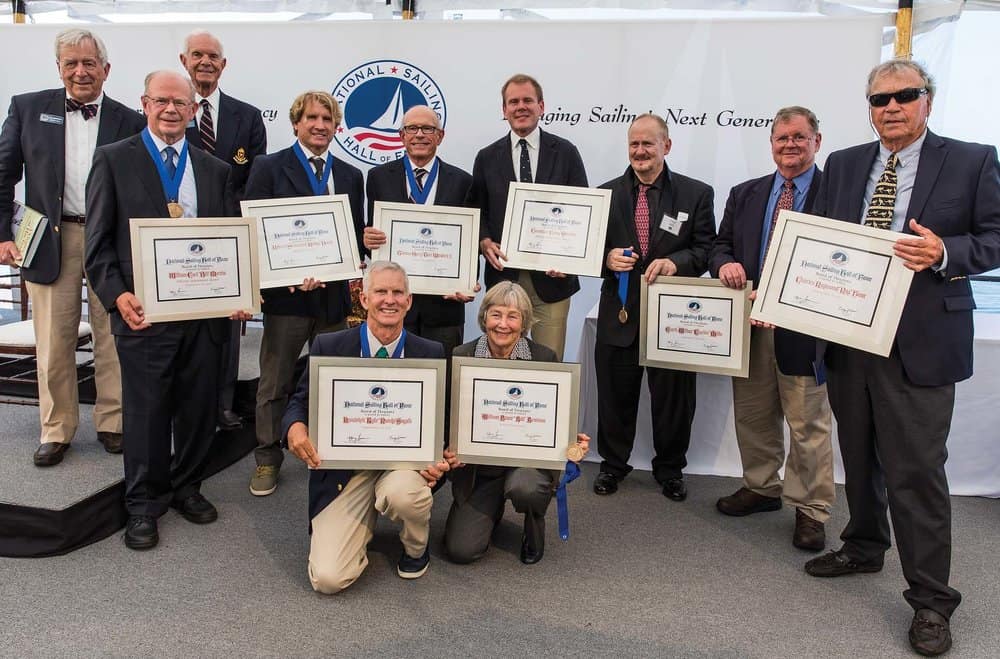On a bright day on the Chester River, Still Pond boatbuilder Graham Ero pulls steadily at the oars in Iris, his 15-foot lapstrake skiff. Together they slide along Eastern Neck Island in a light easterly breeze. Ero thinks of his excursions in Iris as a joint enterprise—him and the boat, a love affair that’s been going on for 40 years now. He built her in 1976 in a shack he was living in on the Connecticut River.
“I built her from wood I dragged out of the marsh and salvaged from a torn down barn,” he says. “She was beautiful. She has a red oak stem, red pine planking, a sugar pine transom, and cypress seats.”
He launched her in early March that year and named her Iris for the iris-blue sky that day. The rest of the month, he rowed the river, but on the first of April, he set off—against a stiff breeze—to row across Long Island Sound from Stony Creek, Conn., to Mattituck, N.Y., a distance of 22 miles. It was a choppy slog.
“I had gotten about eight miles offshore and was contemplating whether I was going to have to turn back,” he remembers. “Then a fishing boat approached me and said, ‘Are you okay?’ He put me in his lee while I rowed, and we talked.”
Ero made it across and slept in the boat that night, then set off early the next morning to row back—this time in a relative calm with the wind at his back. “I was back at Stony Creek by lunchtime,” he says.
For years, Iris was the ‘workhorse’ of whatever boatyard Ero was working in, but life got busier and Irisgot sidelined. She spent a few years ‘in the weeds’ behind Ero’s house, then did a stint in Rock Hall where yard workers literally jumped into her from the dock, breaking her hull. Abused and no longer seaworthy, Iris ended up parked, a silent rebuke (or maybe plea) to her once-doting builder, at Graham Ero’s Wooden Boats, the Still Pond shop where he has spent thirty years building, rebuilding and refurbishing wooden boats. Eventually, Ero knew he needed to make a decision.
“It was either break her up or rebuild her,” he says, though clearly Option A was a total nonstarter. “She had been such a loyal little dog.”So over the winter of 2014, he rebuiltIris and launched her in Fairlee Creek. Though he likes rowing in big water, it was too windy that day to go out on the Bay, so he stayed in the creek. Passing Mears Great Oak Marina, he noticed a pile of trash in the pocket cove created by Jelly Fish Joel’s, the marina’s tiki bar.
“I saw all this crap up in there,” he says. “Unlike fifty or a hundred years ago when everything biodegraded, everything now is synthetic and the shoreline is cluttered with trash. If you’re in a canoe, you can’t do anything about it. But Iris is like a little pickup truck, and you can put a lot of stuff in her!”
That day, he wrestled aboard a broken trash can, several chunks of drywall, a 5-gallon gas can, and a 55-gallon blue plastic drum.
“The boat was piled up like a garbage scow,” he remembers.
Another day, he found an abandoned mattress beached on Eastern Neck Island. Unable to get it intoIris, he towed it, finally dragging it, sodden, up on the boat ramp. As he headed for his truck and trailer, he noticed a couple of watermen in a pickup eyeing him.
“We bin watchin’ you,” they told him as he went past. Ero hesitated, not sure what was coming. “You’re doin’ good work,” they pronounced.
The highway department collects what he leaves at the public ramp and deposits it at the public landfill—Ero knows because he’s seen it piled up there.
A man, a boat and an outlook. It’s all salvage—like the timbers in Iris —but of a different kind. Originally the mission was just to mess about in boats, but it morphed when Ero saw the impact that he and Iriscould make.
“I go up into these beautiful little creeks and I always think, ‘This could be five hundred years ago. It could be what Native Americans saw before we ever got here.’ And then I see a cast-off beer cooler, and it’s such a stark interruption—it annoys me. When I was done in that cove at Jelly Fish Joel’s, it looked like it was supposed to look. Just me and forty-five minutes or so and a boat full of junk made a difference.”
—Nancy Taylor Robson



